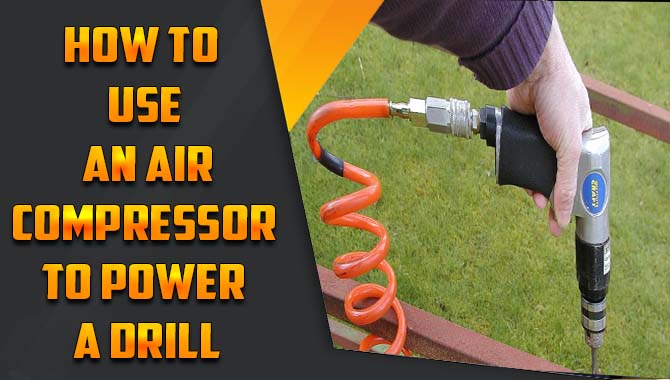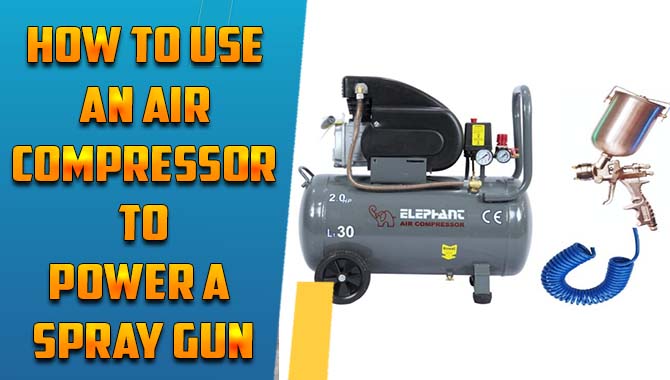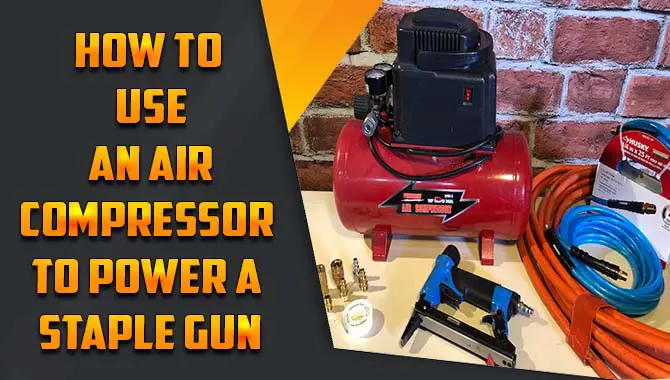As an air compressor owner, you understand that having the right hose is crucial for a smooth-running operation. Selecting the right air compressor hose can be a tough decision, as various types of hoses are available in the market.
However, with the correct knowledge and factors, you can easily choose a hose that best suits your requirements. Here we will guide you in picking the perfect air compressor hose by considering factors such as length, diameter, maximum working pressure, and more.
We will also cover the different types of hoses available in the market and which is best suited for specific applications. Read on to learn all about how to the right air compressor hose for your needs.
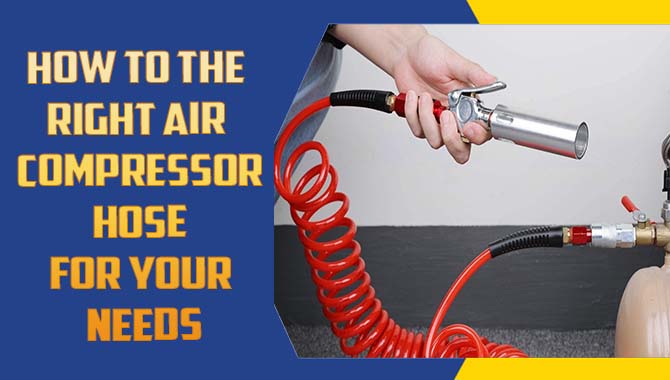
Types Of Hoses: Pvc, Polyurethane Or Coiled
When it comes to hoses, there are several different types to choose from. PVC hoses are a popular option due to their affordability and flexibility, making them ideal for a variety of applications. Polyurethane hoses, on the other hand, are known for their durability and resistance to abrasion and chemicals. They are often used in industrial settings where harsh conditions are common.
Coiled hoses are another option, designed specifically for ease of use and storage. These hoses retract when not in use, making them convenient for small spaces or portable applications. Ultimately, the type of hose you choose will depend on your specific needs and intended use. It is important to consider factors such as flexibility, durability, and chemical resistance when selecting the right hose for your application.
How To The Right Air Compressor Hose For Your Needs: Explained
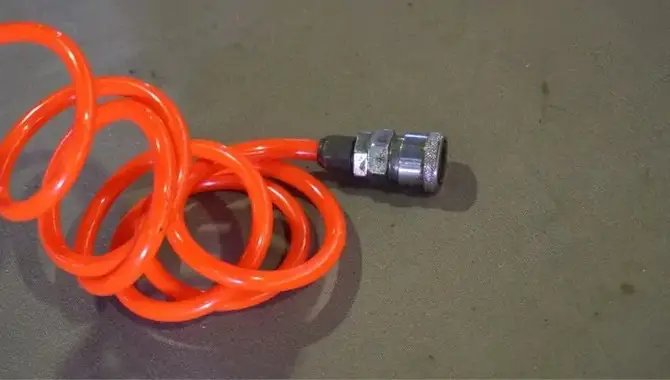
Choosing the right air hose can be daunting, but it’s critical to ensure the efficient operation of your pneumatic tools. Consider factors such as hose length and diameter — longer hoses may lead to pressure drop, while larger diameters offer increased airflow.
Look for durable materials like polyurethane or PVC, which are resistant to kinks and abrasions. When selecting fittings for your hose, consider the requirements of your specific air tool and compressor system. With proper consideration of these factors, you can find how to the right air compressor hose for your needs and maintain optimal performance.
Hose Length For Your Needs
Choosing the right air compressor hose involves taking into account several factors. One of these factors is hose length, which should be appropriate for your work environment and distance from the air compressor. If you need to move around frequently, you might require a longer hose, which could lead to pressure loss if not chosen properly with an appropriate diameter.
While selecting the right length also consider your work area and distance from your compressor. Ensure you have the right fittings and connectors for your air tools and compressor system. Choose between coil or standard hoses depending on how much movement is required during work.
Hose Diameter And Size
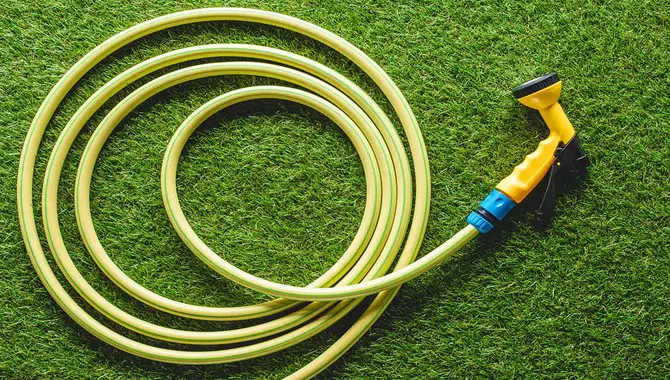
When selecting the right air compressor hose, consider its diameter and size. A larger diameter hose allows for greater airflow and is ideal for heavy-duty applications like nail guns or workbenches. Meanwhile, a smaller diameter hose is more flexible and easier to manoeuvre in tight spaces such as work areas with limited movement.
It’s crucial to match the hose size to your air tool’s requirements while considering its internal/outer diameters and specifications, such as cfm (cubic feet per minute) or psi (pounds per square inch). Also, ensure you choose the right fitting that matches your compressed air supply system for maximum efficiency.
Maximum Working Pressure For Your Application
Ensure that the air compressor hose you select can withstand the maximum working pressure required for your application. Consider choosing a rubber hose instead of a PVC one, as they are more flexible, durable, and abrasion-resistant.
Also, check for the right fittings and match the hose size to the compressor’s output and tool. A longer hose may be necessary if you need to move around frequently; however, it may result in pressure loss, so consider choosing the appropriate diameter for your needs. With these factors in mind, you can easily find the right air compressor hose.
Hose End Fittings: Connectors, Couplers, And Adaptors
Connecting the right fittings is essential for the optimal performance of your air compressor system. Hose end fittings like connectors, couplers and adaptors play a vital role in attaching hoses with different diameter or thread types.
The right selection will ensure hassle-free airflow from the air tool or equipment. Choose fittings that match the specifications of your air hose and tool requirements. It is imperative to select not only the correct fitting but also the durable one for long-term usage. Keep an eye on abrasion resistance, easy storage and lightweight features while selecting a polyurethane or PVC air hose for better longevity.
How To Replace Your Air Compressor Hose
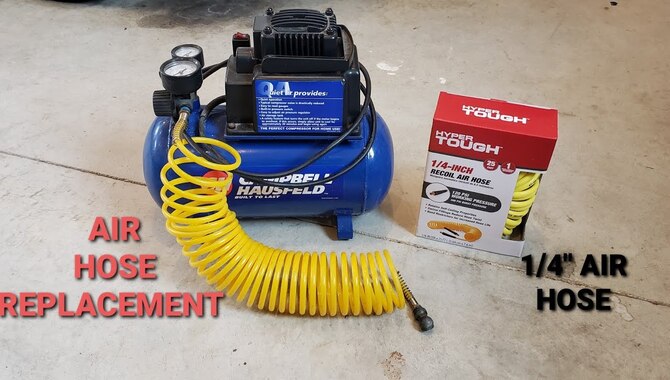
Replacing your air compressor hose is a simple task that can save you a lot of frustration and money down the line. By following these steps, you can easily replace your air compressor hose and ensure your tools function properly. Here’s a step-by-step give on how to replace your air compressor hose:
- Turn off the air compressor and unplug it from the power source.
- Release any pressure from the old hose by pulling the release valve.
- Use a wrench to loosen the fittings on both ends of the old hose and remove it from the compressor.
- Measure the length of the old hose to ensure that you purchase a new one that is the same length or longer.
- Attach one end of the new hose to the compressor by tightening the fitting with a wrench.
- Attach the other end of the new hose to your tool or accessory by tightening its fitting with a wrench.
- Turn on your air compressor and test your new hose to ensure it works correctly.
What Type Of Hose Should You Use For Specific Applications?
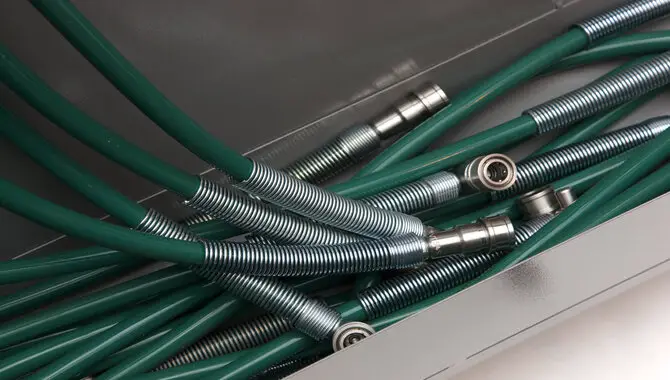
Different compressed air applications require specific types of hoses suitable for the job. For example, a rubber air hose is ideal for heavy-duty tasks such as sanding. And spray painting, while a polyurethane hose. Is perfect for light-duty applications like inflating tires or cleaning.
Braided PVC hoses provide excellent abrasion resistance for rugged outdoor use. While a coiled hose offers convenient storage and flexibility in tight spaces. Always consider the application’s needs before selecting a hose to ensure optimal performance and longevity.
Recoil Hoses Or Standard Hoses: Which One Should You Choose?
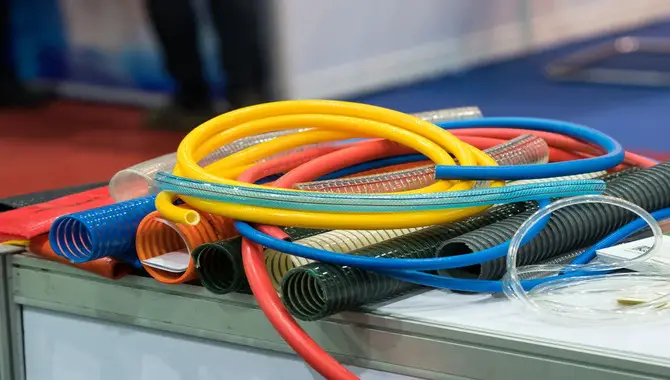
When it comes to choosing between recoil hoses or standard hoses. It all depends on your personal preference and the application’s requirements. Recoil hoses offer convenient storage and are perfect for small-scale tasks such as inflating tires or spray painting.
On the other hand, standard hoses offer higher longevity and are ideal for heavy-duty. Use like powering mechanical tools or sanders. Remember to consider factors such as hose material, diameter, and length when making your decision. Choose wisely to ensure optimal performance and durability in your pneumatic system.
How To Measure The Air Compressor Hose Size Accurately?
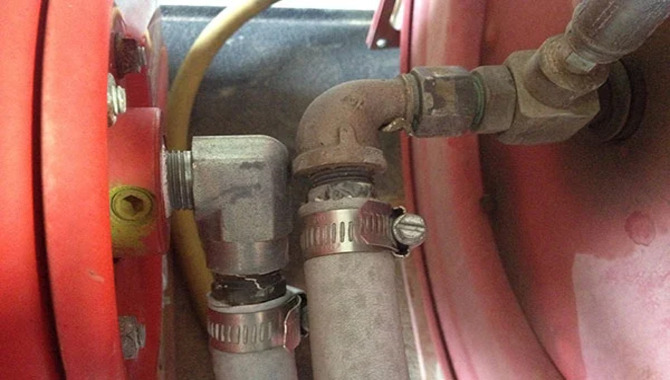
Measuring the air compressor hose size accurately ensures compatibility with your pneumatic system. Start by measuring the hose’s inner diameter (ID), as this determines the volume of compressed air flow.
Next, measure the length of the hose required for your application. Remember that longer hoses can result in pressure drops and reduced airflow, so choose the appropriate length based on your needs. Finally, consider factors such as hose material and fittings to ensure optimal performance and longevity of your compressed air system.
Common Fittings For Air Compressor Hoses
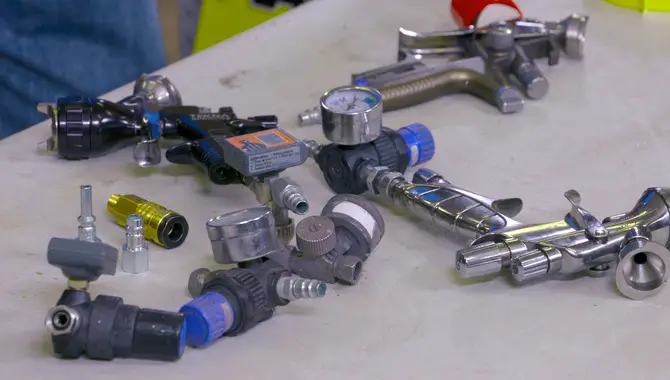
The most commonly used hose fittings include NPT, quick-connect, and universal. NPT (National Pipe Thread) fittings are among the most popular type of fitting used as they can screw directly onto the air compressor or tool. Quick-connect fittings come in handy when you need to swap out tools or hoses quickly, while universal fittings can fit both NPT and quick-connect fittings.
It is important to choose the right fitting that matches your specific tool or equipment requirements, as it ensures a secure and efficient connection with minimal pressure drop. Factors like durability, abrasion resistance, kink resistance, lightweight construction, airflow capacity, and pressure rating play an essential role in determining which type of fitting will be suitable for your needs.
Conclusion
Selecting the right air compressor hose ensures your tool operates safely and efficiently. You need to consider factors like the length of the hose, diameter, maximum working pressure, and type of material before making a decision.
Whether you are looking for PVC, polyurethane or coiled hoses, selecting the right end fittings like connectors, couplers, and adaptors is important. Additionally, regular maintenance and inspection of your hose can help extend its lifespan and prevent potential hazards. By following these tips and guidelines, you can how to the right air compressor hose for your needs. And get the job done efficiently and safely.
Frequently Asked Questions
What Are The Benefits Of Using A Good Air Compressor Hose?
A high-quality air compressor hose can enhance air tool efficiency, prevent energy-wasting air leaks, withstand high pressure and temperature, and ensure safety by avoiding accidents caused by hose failure.
How Can I Use My Air Compressor Hose To Its Fullest Potential?
To maximize the use of your air compressor hose, ensure that you have the right fittings and adapters for your tools, regularly check and maintain the hose’s condition, select the appropriate length and diameter to avoid pressure issues, and use a regulator to prevent tool damage.
How Do I Determine Which Air Compressor Hose Is Right For Me?
When selecting an air compressor hose, analyze the work you will do and the tool requirements. Opt for hoses with the correct length, diameter, and pressure ratings. Ensure durability and flexibility by checking its material. Confirm fittings match your air compressor and tools.
What Are The Different Types Of Air Compressor Hoses Available?
Air compressor hoses come in three types: rubber, PVC, and hybrid. Rubber hoses are sturdy and flexible but costly and heavy. PVC hoses are light and inexpensive but less durable. Hybrid hoses offer a combination of the best features of rubber and PVC for a balance between durability, flexibility, and affordability.
Are There Any Safety Considerations To Consider When Using An Air Compressor Hose?
When using an air compressor hose, it’s important to prioritize safety by wearing protective gear and inspecting the hose regularly for any signs of damage or wear. Correct fittings and following manufacturer instructions for maximum pressure and temperature limits can also prevent leaks and ensure a secure connection.

I am passionate about home engineering. I specialize in designing, installing, and maintaining heating, ventilation, and air conditioning systems. My goal is to help people stay comfortable in their homes all year long.
